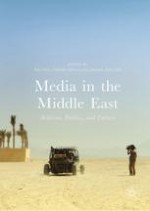2017 | OriginalPaper | Buchkapitel
10. Arabic in a Time of Revolution: Sociolinguistic Notes from Egypt
verfasst von : Ivan Panovic
Erschienen in: Media in the Middle East
Aktivieren Sie unsere intelligente Suche, um passende Fachinhalte oder Patente zu finden.
Wählen Sie Textabschnitte aus um mit Künstlicher Intelligenz passenden Patente zu finden. powered by
Markieren Sie Textabschnitte, um KI-gestützt weitere passende Inhalte zu finden. powered by
